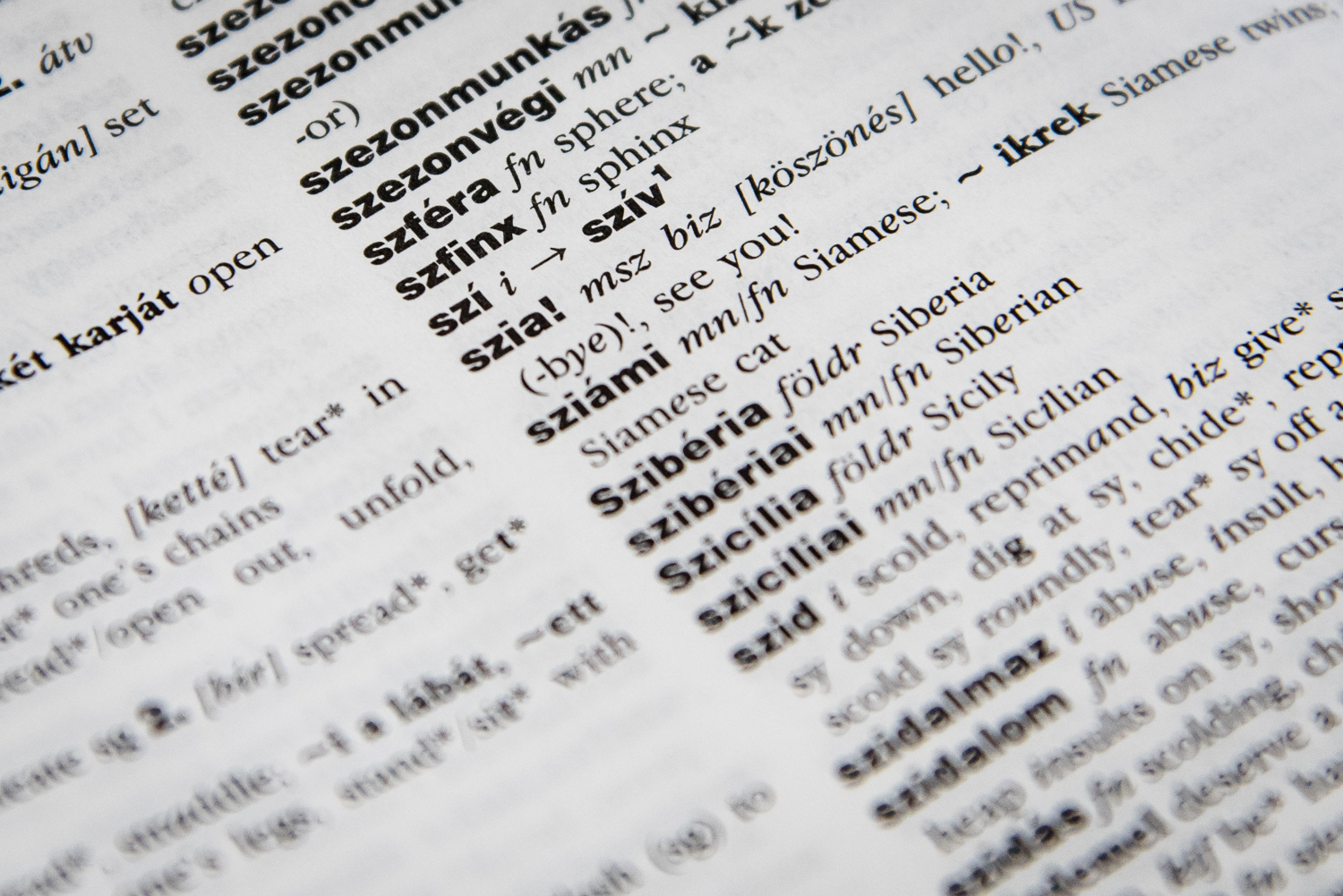One of the most challenging aspects of visiting Budapest is experiencing the unique Hungarian language, including the intricacies of its unfamiliar letters, peculiar vocabulary, and often-puzzling pronunciation. While newcomers may be forgiven for not even attempting to master Hungary’s one-of-a-kind native tongue, it’s well worthwhile to acquire a few basic local phrases, ranging from greetings to directions to ordering a drink. Learn these handy expressions to not only navigate Hungary’s capital with ease, but also to earn the appreciation of locals that you encounter out and about.
1/6
Greetings
In the Hungarian language, there are several ways to greet a person or say goodbye (some of them might sound amusing at first hearing), and expressions differ depending on if they are used in an informal way (between friends) or in a more formal situation.
Szia/sziasztok
(see-yah/see-yah-stoke)
A friendly “hi” or “bye” to one person/to more than one person. Between friends this greeting form is often doubled up by saying “szia-szia”.
Jó reggelt/napot/estét
(yoh reg-gelt/nah-poht/esh-tet)
“Good morning/afternoon/evening” Hungarians use these expressions as formal ways of greeting at different times of day.
Jó éjszakát
(yoh ey-sa-kat)
“Good night” You can use this both in a formal or informal conversation.
Viszontlátásra
(vee-saunt-lah-tahs-ra)
“Goodbye” A formal term for farewell. In friendly company, you can simply say “szia”, as explained above.
Puszi
(poo-see)
“Kiss (on the cheek)” – so it’s not what you might have thought about first! Upon concluding a face-to-face meeting or a phone call, close friends simply use this word to say goodbye. If you perk up your ears, oftentimes you can hear “puszi” combined with “szia”, creating the phrase “szia-szia, puszi-puszi”.
Hogy vagy?
(hoj-dj vah-dj )
“How are you doing?” Right after greeting a friend, Hungarians usually ask about each other’s well being, which is oftentimes followed by a lengthy response, whether it’s good or bad, starting with:
Köszönöm, jól.
(keu-seu-neum yohl)
“I’m fine, thank you.” or
Nem jól.
(nem yohl)
“I’m not well.”
2/6
Introductions
When you meet a local in Hungary, expect abundant questions about your name and your place of origin, and while an increasing number of people speak English at various levels in the cities, people who do not speak Hungarian can find themselves in situations when they need to find a way to overcome language barriers. To make your life easier, here are informal ways of basic introduction.
Mi a neved?
(mi aw neh-ved)
“What’s your name?” An informal way of asking about someone’s name.
A nevem…
(ah neh-vehm)
“My name is…” Then fill in the blank with your name.
Honnan jöttél?
(hon-nan yot-tel)
“Where are you coming from?” An informal way of asking about your place of origin.
Hány éves vagy?
(Hauwn eh-vehs vah-dj)
“How old are you?” Note that not everyone is keen on sharing the secret of their age with you.
Beszélsz magyarul/angolul?
(bass-ale-ss ma-ja-rule/on-goh-lool)
“Do you speak Hungarian/English?” An informal way of trying to find a common language to interconnect.
Nem beszélek magyarul/angolul.
(nem bass-ale-lack ma-ja-rule/on-goh-lool)
“I don’t speak Hungarian/English.” In this case you might want to find someone who can help with translating, or start using gestures to explain what you are up to.
3/6
Shopping
Around the touristic hotspots and the major shopping zones there is always someone speaking English, but in smaller locales it’s easy to run into difficulties created by language barriers. Learn how to purchase a public-transport ticket, or how to say if you prefer paying by cash or card.
Szeretnék egy…
(se-ret-nayk eh-dj)
“I would like a…”. Use this expression when you want to purchase something.
Egy jegyet kérek.
(eh-dj yej-et keh-rack)
“A ticket please.” When you buy a public-transport ticket or you want to enter a museum.
Mennyibe kerül?
(men'-nyi-be ke-rewl)
“How much does it cost?”
Bankkártya
(Bahnk-kaar-tya)
“Bankcard” Most shops and restaurants accept card payment in Budapest.
Készpénz
(kes-penz)
“Cash” While most places accept bankcards or credit cards, there are still a few spots where you can only pay with cash.
Csak nézelődöm.
(chok nay-ze-lo-dom)
“I’m just looking.” If you enter a shop just to browse around.
4/6
Bars and restaurants
Make sure to venture into the culinary adventures that Budapest has to offer, and try some of the many hip bars around town. Luckily, the staff speaks English almost everywhere – as far as downtown is concerned – but if not, or in case you want to impress someone, here are some basic guidelines:
Kérek egy pálinkát/bort/sört
(keh-rack eh-dj pah-lin-cat/bore-t/shirt)
“I would like a pálinka (Hungarian fruit brandy)/wine/beer” Certainly this will be one of your most extensively used expressions during your stay in the Hungarian capital.
Egészségedre!
(ag-eh-sheg-ad-reh)
“Cheers!” Say this when you clink your wine glasses, and don’t forget to look into the other person’s eyes. You can also use this as “bless you” if someone sneezes. No kidding!
Jó étvágyat!
(yoh eht-vah-djot)
“Enjoy your meal!” Hungarians always say 'jó étvágyat” to each other before they start devouring their meal.
A számlát kérem!
(aw sam-lat keh-rem)
“The bill, please!” Common term for getting the bill in a bar or restaurant. Don’t forget to check if the tip is included. Read our guidelines on tipping here.
5/6
Direction
Whether you navigate Budapest on foot or by car, it’s good to know the basic directions to find your way from one point to another hassle-free. In case you try to get around by car, check out our tips and hints about the driving laws of Hungary.
Hol van a…?
(hol vahn aw)
“Where is the…?” Depending on what you are looking for, fill in the blank.
Itt/ott
(eat/oht)
“Here/there”
Balra/jobbra/egyenesen
(bawl-ra/yohb-ra/e-dye-ne-shen)
“Left/right/straight”
A sarkon
(ah shor-kon)
“At the corner”
Bejárat/Kijárat
(beh-yah-raht/kih-yah-raht)
“Entrance/Exit”
6/6
Other essentials to help you get around
There are many other words and terms that are good to know during your stay in the Magyar metropolis, and you are guaranteed to hear some of the following phrases over and over again in the streets of Budapest:
Igen/nem
(ee-gen/nehm)
“Yes/no”
Nem értem/nem tudom
(nehm eyr-tem/nehm-tu-dome)
“I don’t understand/I don’t know”
Köszönöm
(keu-seu-neum)
“Thank you” You will often hear the short form of this as “köszi” (koh-see)
Szívesen
(see-ve-shen)
“You’re welcome”
Elnézést
(el-ney-zeysht)
“Excuse me” You can open with this phrase if you want to approach a person on the street with a question, or if somebody stands in your way.
Sajnálom
(shoy-nah-lawm)
“I’m sorry”
Várj!
(vahr-yawl)
“Wait!” You will not only hear this if you have to wait for something, but also instead of “one moment, please”.








